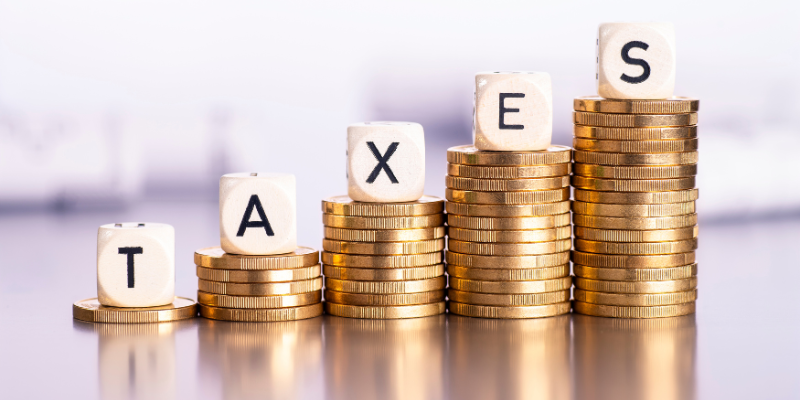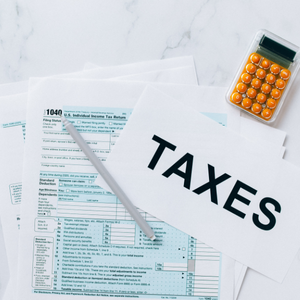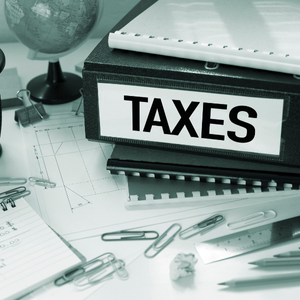
Taxes hit you from three different angles when you sell your Maryland home, but no need to panic. You’re not stuck paying for everything solo.
Some of these taxes get split between you and the buyer, and others might not even apply to you at all if you qualify for certain exemptions. The real challenge is figuring out which ones are definitely coming your way and which ones you can sidestep entirely. Direct MD Cash Buyers is here to help simplify the process and guide you through what to expect. Here’s a detailed guide to help you with that!
Do Sellers Pay Taxes When Selling a House in Maryland
You’ll definitely be writing some checks as a seller, but it’s usually way less than you think. The typical Maryland seller ends up paying capital gains tax (if they made a profit), their portion of the year’s property taxes, and about half of the transfer tax that gets the deed switched over to the new owner.
But if you lived in your house as your main home for at least two of the past five years, you might not owe any capital gains tax at all. This applies even if you made a decent chunk of money on the sale.
What Taxes Do You Pay When Selling a House in Maryland
Wanna know what’s actually going to hit your bank account when you sell? There are three main taxes that’ll come knocking and we promise they’re not nearly as scary as your neighbor made them sound.
Property Taxes
Property taxes are the least of your worries when you’re selling. They’re super fair, and you’re only paying for the time you actually lived there. Plus, your buyer’s picking up their fair share, too, so you’re not getting stuck with the whole year’s bill.
What are Property Taxes and How are They Calculated

To figure out what you owe, Maryland takes what your house is worth and multiplies it by your local tax rate, which averages out to about 0.95% across the state.
They only reassess your place every three years. This is advantageous to you because it means your taxes aren’t going crazy every time the housing market has a moment. What’s more, if your home value shoots up unexpectedly, they don’t just slam you with a huge bill the next year. They spread that increase over three years, so you’re not eating ramen for months just to pay your taxes.
Your rate depends on where you live, though. That’s 0.68% if you’re lucky enough to be in Talbot County or 1.72% if you’re dealing with Baltimore City’s rates.
Property Tax Proration Between Buyer and Seller
You literally only pay for the days you owned the house during that tax year and that’s it. So let’s say you close on June 30th (which happens to a lot of people for some reason), you’re paying January through June and your buyer gets July through December.
The title company will calculate the figures for you at closing. They’ll break it all down on your settlement sheet. Most people are like “Oh, that’s it?” when they see the actual number.
Transfer Taxes and Recordation Taxes
Maryland gets a little something every time a house changes hands, and that’s transfer taxes. It’s somehow like the state’s commission. You’re usually splitting this with your buyer, so it’s not all on you.
State Transfer Tax Rates and Who Pays
Maryland has a flat 0.5% transfer tax on whatever you sell your house for. Pretty much everyone just splits it 50/50 with the buyer. It’s like an unwritten rule at this point. So if you sell for $400,000, the state wants $2,000 total, you pay $1,000, buyer pays $1,000, done.
Now, you can totally negotiate this if you want. Many sellers cover the whole thing to make their offer more attractive or ask buyers to handle it when the market’s really hot and they know they can get away with it.
County and Municipal Transfer Tax Variations
Hold up, though, the state tax isn’t the only transfer tax you’re dealing with. Your county and city probably want in on this action, too.
Some places like Montgomery County tack on an extra 1% (ouch), while others keep it super light or don’t have one at all. Your real estate agent should know exactly what your area charges, but definitely ask because this can cost you a lot.
Transfer Tax Exemptions for First-Time Buyers
Not enough people know that if your buyer is a first-time homebuyer in Maryland, they get their transfer tax cut in half! So instead of paying that full 0.5% to the state, they only pay 0.25%, which means if you’re splitting it, your half just got cheaper, too.
The buyer has to actually live in the house as their main home to qualify. It doesn’t work for investment properties or vacation homes.
But this is actually one of those things that can make your house more attractive to a whole bunch of buyers, especially younger folks who are trying to scrape together every penny for their first place.
Capital Gains Taxes
Capital gains tax is what you might owe on the profit you made from selling your house. But before you start hyperventilating, there’s this thing called the primary residence exclusion that could save you a lot of money.
Federal Capital Gains Tax Rules and Exemptions
If you lived in your house as your main home for at least two out of the last five years before you sold it, you can exclude up to $250,000 of profit if you’re single or $500,000 if you’re married filing jointly.
That’s right, you could make half a million dollars on your house sale and not owe the feds a single penny in capital gains tax! The two years don’t even have to be consecutive, and you can use this exclusion every two years if you keep moving around.
Most people in Maryland are totally covered by this exclusion. This is because making more than $250,000 profit on a regular family home is pretty rare unless you’ve been sitting on it for like 20 years or bought in a neighborhood that went completely nuts.
Maryland State Tax on Capital Gains
Maryland treats your capital gains just like regular income, but the tax rates have changed significantly as of 2025. Whatever profit you made that didn’t get excluded by that federal rule we just mentioned gets taxed at higher rates than before.
Due to the Maryland Budget Reconciliation and Financing Act signed in May 2025, your capital gains could face higher tax rates depending on your total income level, with rates now going up to 6.5% for the highest earners.
But the bigger change is that Maryland added a 2% capital gains surcharge that applies to all net capital gains if your federal adjusted gross income exceeds $350,000. The primary residence sales under $1.5 million are exempt from this surcharge, along with retirement accounts and several other categories.
Moreover, Maryland still follows the same exclusion rules as the federal government. This means if you qualify to exclude your gains federally, you’re experiencing this at the state level too.
But let’s say you made $300,000 profit as a single person. The first $250,000 is totally free, but Maryland would now tax the remaining $50,000 at your regular income tax rate. And if your total federal AGI is over $350,000, you’d also pay the additional 2% surcharge on those gains.
It’s definitely more expensive than before and something to factor into your selling decision, especially if you’re a higher-income earner.
Primary Residence Exclusion Requirements
Getting a capital gains exclusion isn’t complicated, but you do have to check a few boxes to make sure you qualify. As mentioned, you need to have owned the house for at least two years and lived in it as your main home for at least two years out of the last five. You can’t have used this exclusion on another house sale within the past two years.
The ownership and residence tests are separate, so if you inherited the house but lived in it for two years, you’re good to go. Also, if you’re married, only one of you needs to meet the ownership requirement, but you both need to meet the residence requirement to get that full $500,000 exclusion. Make sure you’re both actually living there and not just one person while the other travels for work constantly.
Who Pays What: Buyer vs. Seller Tax Breakdown
Now, let’s lay out exactly who’s writing checks for what when you close on your Maryland house sale. We know it’s been a lot of information, but this is where it all comes together in a way that actually makes sense for your wallet.
Seller Tax Obligations
As the seller, you’re definitely gonna pay a few specific things, and there’s really no getting around most of them. Your biggest expense is probably going to be capital gains tax if you made a decent profit and don’t qualify for that exclusion we just talked about. This one’s all yours and the buyer can’t help you out.
You’re also paying your share of the property taxes up to closing day, which is totally fair since you lived there and enjoyed the house during that time.
Then there’s your half of the state transfer tax. This is typically $1,000 on a $400,000 sale, though some sellers will offer to cover the buyer’s half, too, if they’re trying to make their offer more attractive.
And don’t forget about any outstanding property tax bills from previous years. Those need to be cleared up before you can hand over the keys. One way to simplify the process is to sell your home for cash in Brunswick or nearby cities, where buyers handle the details and you can move forward faster.
Buyer Tax Responsibilities
Your buyer isn’t getting off scot-free either, but their tax responsibilities are different from yours. They’re picking up property taxes from closing day forward, which makes perfect sense since they’ll be the ones living there and benefiting from all those local services the taxes pay for.
They’re also typically covering their half of the transfer tax, plus any county or municipal transfer taxes (though again, this stuff is negotiable if you want to get creative).
If they’re getting a mortgage, they’ll probably set up an escrow account to handle future property tax payments automatically. This will make life way easier for everyone involved. Plus, if they’re first-time buyers, they might get that transfer tax discount we mentioned, which could save both of you some money.
Negotiable Tax Costs
Not everything is set in stone. There’s room to negotiate on some of these costs depending on your market situation. Transfer taxes are the big one that people play around with, and we know many sellers cover the whole thing to make their offer more competitive, especially when there are multiple bidders involved.
You can also negotiate who pays for things like title insurance and recording fees, which aren’t huge amounts but every bit helps when you’re trying to make your offer stand out.
Some sellers will even offer to pay a chunk of the buyer’s closing costs, which could include some tax-related expenses, if it means getting their asking price. Just remember that anything you negotiate to pay extra comes directly out of your proceeds. Always do the math.
Tax Relief and Credits for Maryland Home Sales
Believe it or not, Maryland wants to help you keep more of your money. There are several programs and credits that can seriously reduce your tax bill.
Homestead Tax Credit
If your home value increases more than 10% from last year, the credit caps how much extra tax you pay on that increase. Maryland automatically applies this credit to your primary residence when your assessment jumps. You don’t have to do anything special to get it, which is awesome because who has time for more paperwork?
The state sets the max benefit at 10%, but your county can make it even better by setting a lower cap, like 5% or 7%, which means even more savings for you.
Homeowners’ Property Tax Credit Program

This program is seriously underutilized, and it bugs us because so many people could be saving money, but just don’t know about it! If your household income is on the lower side, you could get a tax credit that reduces your property tax bill every single year.
You have to reapply annually and provide your income info. The deadline is September 1st, so mark your calendar right now because this is free money we’re talking about.
The credit amount depends on your income and your actual property tax bill. It works on a sliding scale, so the less you make, the bigger your credit gets.
Many families save hundreds or even thousands of dollars a year with this program, but you have to actually apply. They’re not going to hunt you down and give you free money.
Deductible Home Improvements and Repairs
Any major improvements or repairs you made specifically to get your house ready to sell can potentially reduce your taxable profit. These are things your buyer requested after the home inspection or upgrades your agent told you to make to get top dollar, not just regular maintenance stuff you should have been doing anyway.
That’s why it’s important that you keep every single receipt and estimate. Also, document any communication from your agent or the buyer about what needs to be fixed or improved, because the IRS loves proof.
These have to be related to the actual sale process, not just random projects you did because you felt like updating your kitchen. Though honestly, major renovations over the years can add to your cost basis and reduce your overall gain, too.
Special Property Types and Tax Implications
The type of property you’re selling makes a huge difference in what the government expects from you. Here are some insights!
Investment Property vs. Primary Residence
Selling rental property is way less fun than selling your actual home because you can’t use that amazing capital gains exclusion at all. You’re stuck paying taxes on every penny of profit you made, plus this thing called depreciation recapture that basically claws back all those tax breaks you got while you owned the rental.
So if you made $100,000 profit on your rental house, you’re paying capital gains on the full amount, not just anything over $250,000 like you would with your regular house.
Maryland’s going to treat that gain as regular income, too, so you could be looking at 5.75% state tax on top of whatever the feds want. The only way out is doing a 1031 exchange, where you buy another rental property. That’s so complicated, you’ll need a pro to hold your hand through the whole thing.
Inherited Property Sales
If you inherit a property, you get this incredible tax break called a stepped-up basis that can save you thousands. Basically, when you inherit a house, the IRS pretends you bought it for whatever it was worth when the person died, not what they originally paid for it back in the day.
So let’s say your uncle bought his house for $75,000 in 1990 and it’s worth $350,000 when he passes away… if you sell it for $365,000, you only pay capital gains on $15,000, not $290,000! That’s a massive tax-freebie just for inheriting property.
Just make sure you get that house appraised right around the time of death. You’ll need that number to prove your stepped-up basis if the IRS contacts you later.
Rental Property Tax Considerations
If you’ve been renting out your house and now want to sell, you’re dealing with a whole mess of extra tax rules that might make your head spin. But if you lived there as your main home for two years out of the last five, you might still get part of that capital gains exclusion, but only for the time you actually lived there, not the rental years.
You’ll also have to pay back some of those depreciation deductions you took while it was a rental. Yeah, the IRS giveth and the IRS taketh away.
And if you converted your home to a rental after 2008, there are these weird ratio calculations about how much gain you can exclude based on personal use versus rental time. This might stress you if you try to figure it out yourself.
Time Your Sale for Maximum Tax Benefits
The end of the year can actually be a smart time to sell if you’re trying to manage your tax situation. This is especially true if you’ve had a low-income year or want to offset other gains with losses.
If you’re close to qualifying for that two-year primary residence rule but not quite there yet, waiting those extra few months could save you tens of thousands in capital gains tax. Wait until January instead of selling in November if it means hitting that two-year mark.
Also, if you’re getting married or divorced, the timing of your sale relative to your change in filing status can make a huge difference in whether you qualify for the $250,000 or $500,000 exclusion.
If you’ve got a bunch of home improvements or repairs you’re planning to do anyway, doing them right before you list can help reduce your taxable gain. Don’t rush to sell before you’ve squeezed every possible deduction out of your situation. Or, if you’d rather skip the wait and the work, you can sell your home for cash in Salisbury or nearby cities and move on quickly.
How Cash Buyers Simplify the Tax Process
Selling your Maryland home to cash buyers can actually make the whole tax side of selling way less stressful and way more predictable.
When you’re dealing with cash buyers, you can actually plan your taxes with real dates instead of crossing your fingers and hoping your sale closes when you think it will. With traditional buyers, you’re at the mercy of their mortgage approval and all that other stuff that can push your closing from December into January and totally mess up your tax year. But cash buyers? They can close in like two weeks if you want them to.
This means if you need the sale to happen in 2025 for tax reasons, it’s actually going to happen in 2025. Plus, you don’t have to worry about deals falling through at the last minute and screwing up all your tax planning. Cash buyers who are serious about your house aren’t going anywhere.
And let’s be real, when you know exactly when you’re closing, you can time other financial moves around it, like maybe selling some stocks at a loss to offset your house gains or making sure you’ve got all your receipts organized for deductions before tax season hits.
FAQs About Maryland Home Sale Taxes
Do I have to pay taxes if I barely made any profit?

If your profit falls under that $250,000 (single) or $500,000 (married) federal exclusion and you lived in the house for two years, then nope, you’re totally off the hook for capital gains tax! You’ll still pay your share of property taxes and transfer taxes because those aren’t based on profit, but those are pretty manageable amounts.
Can I deduct realtor commissions and closing costs?
Yes, and these costs can seriously reduce your taxable gain! Your realtor commission, title insurance, attorney fees, and other closing costs all get subtracted from your sale price when calculating capital gains. Keep every single receipt because these deductions can sometimes be the difference between owing capital gains tax and owing nothing at all.
What if I inherited the house but lived in it?
This is a good situation tax-wise because you get the best of both worlds. That’s stepped-up basis from inheriting plus potentially qualifying for the capital gains exclusion. You still need to meet the two-year residence requirement, but the inherited stepped-up basis gives you a huge head start on minimizing your taxes.
When do I actually pay these taxes?
Property taxes and transfer taxes get handled at closing, so they’re deducted from your proceeds right then and there. Capital gains taxes are different, though. You’ll pay those when you file your tax return for the year you sold the house. So if you sell in 2025, you’ll deal with capital gains when you file your 2025 taxes in early 2026.
What happens if I sell before living there for two years?
You’ll miss out on that capital gains exclusion, which means you’ll pay taxes on your full profit instead of getting that $250,000 or $500,000 freebie. There are some exceptions for job changes, health issues, or other qualifying circumstances, but generally, you want to hit that two-year mark if possible.
Key Takeaways: Who Pays Taxes When Selling a House in Maryland
Selling your Maryland home doesn’t have to be a tax nightmare if you know what you’re dealing with upfront. Most sellers end up paying way less than they feared, especially if they qualify for that primary residence capital gains exclusion that can save you hundreds of thousands of dollars. The biggest thing to remember is that property taxes get split fairly, transfer taxes are usually negotiable, and capital gains might not even apply to you if you lived in your house long enough.
Worried about the taxes when selling your home? From transfer taxes to capital gains, the costs can add up quickly—but they don’t have to overwhelm you. Direct MD Cash Buyers is here to help. We buy houses for cash, explain what taxes you may face, and handle the details so you can sell quickly and stress-free. Ready to sell or have questions? Contact us at (443) 391-7080 for a no-obligation offer. Get started today!
Helpful Maryland Blog Articles
- Selling Your Home By Owner In Maryland
- Selling A Probate House In Maryland
- Selling Your Home During A Divorce In Maryland
- Selling Your Maryland Home During Foreclosure
- Filing A Quitclaim Deed For Real Estate In Maryland
- Selling Tenant Occupied Property in Maryland
- Selling a House in Bad Condition in Maryland
- Who Pays Taxes When Selling a House in Maryland?
- How to Handle an Inherited House with Sibling in Maryland
- How Do I Get My Name Off a Mortgage in Maryland?
- Can You Sell A House with Asbestos in Maryland
- Can the Seller Back Out of A Contract in Maryland
- How to Sell A Condemned House in Maryland

